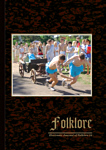We Believe! Online Representations of the Olympic Winner as a Mythic Hero
We Believe! Online Representations of the Olympic Winner as a Mythic Hero
Author(s): Piret Voolaid , Liisi LainesteSubject(s): Customs / Folklore
Published by: Eesti Kirjandusmuuseum
Keywords: conspiracy stories; fan culture; folklore about doping cases; mythic hero; national identity; sports folklore; stereotypes
Summary/Abstract: This article is a study of the doping scandal that broke out in April 2011 and concerned the esteemed Estonian sportsman and Olympic gold medal winner, Andrus Veerpalu. The current analysis is based on the material collected from the Estonian online media throughout two years, from April 2011 to March 2013, during which Andrus Veerpalu’s court case was actively followed by the Estonian sports circles and laymen alike. We will analyse how the image of Andrus Veerpalu as a national hero (almost as a demigod) is constructed on the Internet and how it relates to analogous stories about athletes from earlier times (e.g., to folk stories about Georg Lurich). In the current case, the main reason why the majority of the nation supported Andrus Veerpalu was because they believed in him. This pervading thread emerged right after the news spread, and was present in various contexts: the online comments of the articles that dealt with the scandal, Facebook community posts in the group entitled “We believe in Andrus Veerpalu” (“Usume Andrus Veerpalu”), which was created to show solidarity with the sportsman, etc. All this indicated the high status of the athlete and laid a foundation for a sincere and positive discourse. This was in opposition to the negative discourse of irony, which questioned the honesty of the athlete and foregrounded subversive emotions like indifference and superiority towards the topic. The analysis will address the emergence of the Olympic hero as a national myth, and point at various narratives that deal with the scandal through the present-day genres of urban legends, conspiracy stories, and Internet humour.
Journal: Folklore: Electronic Journal of Folklore
- Issue Year: 2013
- Issue No: 54
- Page Range: 9-38
- Page Count: 30
- Language: English

